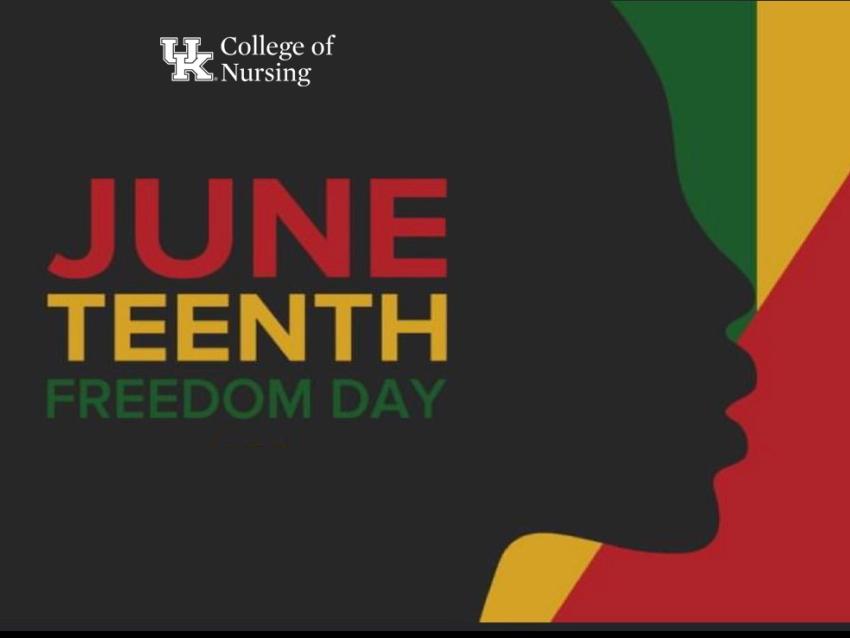
Juneteenth Blog: Nursing’s Continued Role in Fighting Racism and Advancing Racial and Social Justice
***
“Those who do not remember the past are condemned to repeat it.”- George Santayana
Juneteenth is a monumental day in world history that marks slavery’s true end in the United States. It recognizes the June 19th, 1865, date when Union Soldiers arrived in Galveston, Texas to declare freedom to those who remained enslaved. Although the Emancipation Proclamation was signed over two years prior to this historic event, slaves who were under Confederate control remained in bondage. As such, Juneteenth, which is commonly referred to as The Day of Jubilee, has long been recognized as the National Independence Day for African Americans, despite only being established as a national holiday in 2021. By commemorating this historic day, we not only celebrate freedom, but recognize the critical role slavery played in the growth and development of the U.S. and how it must help shape our efforts to address contemporary racism and the social injustices that continue to plague our society.
As nurses, we play a central role in recognizing and bringing awareness to the myriad manifestations of racism that are deeply rooted in the history of our country. These negative experiences shape the identities and everyday experiences of our African American, Native American, Hispanic/Latinx, and Asian patients, as well as our fellow nurses.
Racism in the profession of nursing is well documented. Minorities often operate in the profession in an isolating environment and report daily acts of racism ranging from microaggressions to greater structural barriers that impede career advancement. Despite the systemic and structural barriers that they encounter, minority nurses have fought for their rightful place in the field of nursing and continue to emerge as leaders of the profession. Racism within the healthcare system and its resulting health inequities are also well documented with racialized minorities reporting lack of trust and delayed health seeking as a result facing discrimination during healthcare interactions.
Acknowledging that racism exists is fundamental to framing or reframing our lens to establish a clear path forward to eradicating racial and social injustices. The power of nursing lies in the strength of our collective advocacy and engagement efforts to promote diversity, equity and inclusion (DEI).
The first actionable step in our fight against racism is Reflection. Not only do we need to reflect on how our personal biases, prejudices, and assumptions are shaped, but also on how they impact the way we perceive and treat others. Self-reflection regarding our professional values of respect, dignity, altruism, and justice, and aligning these with our personal values is also necessary to promote the safety and wellbeing of our patients. Second, is Education. Education is key to building cultural humility and opening our minds to new and innovative ways of addressing racial and social injustices. Completing equity training (e.g. unconscious/implicit bias or antiracist training) and staying updated on the research and literature is essential to broadening our lens. As nursing faculty, we have a greater responsibility to ensure that our future generation of nurses are prepared to serve and advocate for our growing diverse population. This responsibility includes providing culturally responsive teaching, diversifying our faculty and leadership, assessing and revising curricula and educational resources for bias, and developing programmatic outcomes for DEI and antiracism. And finally, we need to take thoughtful and intentional Action via personal engagement through service, research and advocacy efforts that promote DEI. This includes serving on DEI or antiracism committees or councils, advancing community engaged research that empowers marginalized voices and addresses the social determinants of health, and advocating for policies that help eradicate racial and social inequities in health.
Despite the progress we have made since Juneteenth, our work as nurses and as a nation in ending racism is far from over. Racism is a public health crisis that we continue to see and experience on a daily basis. Therefore, to build a more fair and just society, our fight to address racial inequities must be equally as persistent.
Learn More:
- Podcast: See You Now Podcast. Episode 53: Honoring Juneteenth. Johnson and Johnson, ANA, https://nursing.jnj.com/see-you-now-podcast/53-honoring-juneteenth
- National Commission to Address Racism in Nursing. Racism in Nursing. https://www.nursingworld.org/practice-policy/workforce/clinical-practice-material/national-commission-to-address-racism-in-nursing/
- https://www.juneteenth.com/
***
